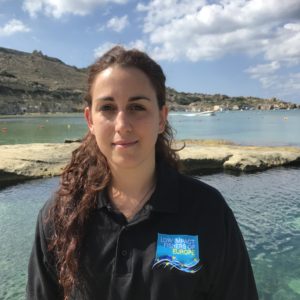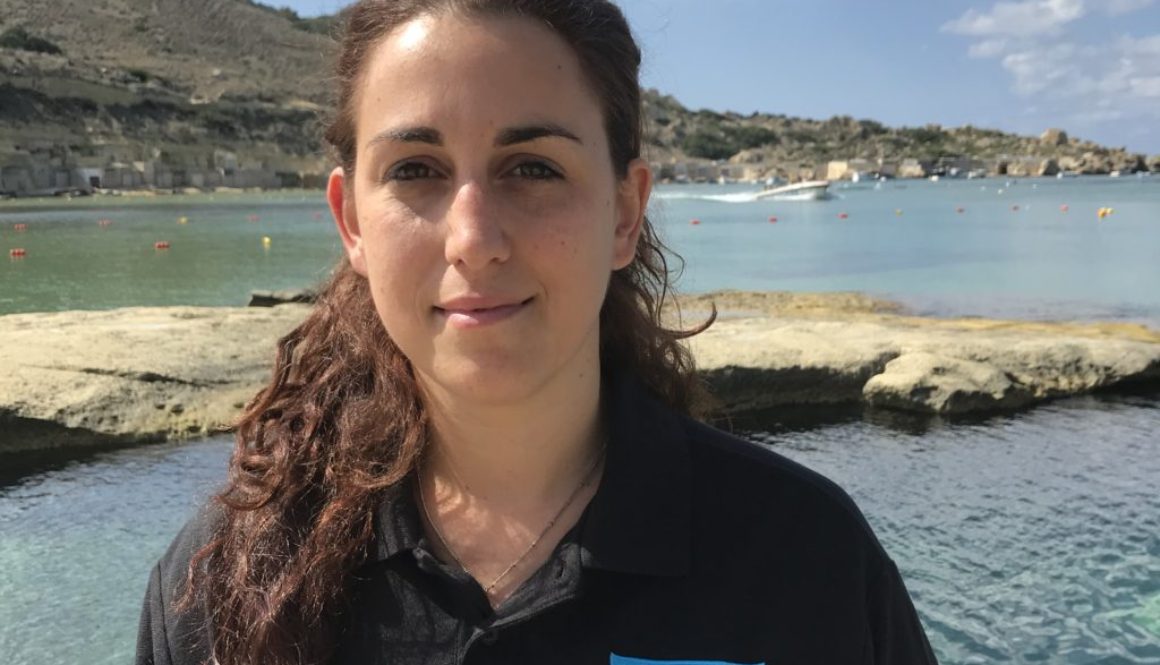Upoznajte Aliciju Said, našu voditeljicu projekata za Maltu

Bruxelles, 11. listopada 2018.
Claudia Orlandini
U okviru svog trogodišnjeg projekta "Uključivanje malog ribolova s niskim utjecajem na Sredozemlje" financiran od strane Zaklade MAVA, LIFE jača svoju prisutnost na terenu kako bi pružio veću podršku zajednicama malog ribarstva u regiji (kliknite ovdje za više informacija o projektu). Alicia Said je odabrana da pomogne LIFE-u u ovom važnom zadatku diljem Malte. .
Draga Alicia, dobrodošla u LIFE! S akademskom pozadinom u području ljudske ekologije i dugogodišnjim iskustvom u radu s ribarima na terenu, uključujući i putem mreže Too Big To Ignore, možemo reći da si već neko vrijeme “ovisna” o malom ribolovu. Što je pokretačka snaga tvoje strasti za podržavanjem sektora malog ribolova?
Odrastao sam u ruralnoj zajednici okružen poljoprivrednicima i ribarima, a moj otac je bio jedan od njih, i imam lijepe uspomene na djetinjstvo na moru. U posljednjih 10 godina počeo sam primjećivati nestanak onoga što je nekada bilo živahnih ribarskih zajednica i stvarno sam želio razumjeti što se događa i zašto napredna obala polako postaje samo draga uspomena. Stoga sam odlučio nastaviti studij u ovom području kako bih istražio što je pokretalo te velike promjene. Dakle, posljednjih pet godina posvećeno je razumijevanju sektora malog ribolova na Malti, a u novije vrijeme, problematiku sam promatrao iz globalne perspektive kroz svoje postdoktorsko istraživanje s Globalnim partnerstvom za istraživanje malog ribolova "Too Big to Ignore".
Maltežanin ste i dobro poznajete sektor u svojoj zemlji. Možete li nam reći više o trenutnoj situaciji malog ribarstva na Malti? Koji su glavni izazovi s kojima se malteški ribari suočavaju lokalno?
Kao istraživač, fokusiram se na održivost malog ribarstva, jer vjerujem da je to put naprijed za stvaranje održivih ribarskih zajednica, posebno u malim otočnim državama poput Malte. Malteški mali ribolov ranjiv je na postupne implikacije koje proizlaze iz promjena politike koje su se odrazile na endogene malteške ribolovne obrasce od pristupanja EU-u 2004. Pristup ribolovnim resursima i kvotama, konkurencija s drugim korisnicima mora, kao i smanjenje ribljih zaliha te problemi vezani uz pristup forumima za donošenje odluka samo su neki od izazova s kojima se suočavaju malteški ribari. Štoviše, ta su pitanja složena i međusobno povezana te stoga njihovo rješavanje zahtijeva pažljivu pozornost i uključivo sudjelovanje samih ribara.
Regrutiranjem vas kao Voditelj projekta za Maltu, LIFE, želi dati malteškim malim ribarima priliku da imaju nekoga na terenu tko će im pomoći u jačanju njihovih lokalnih mreža, da ih podrži u osmišljavanju lokalnih projekata i rješenja ali i u tome da se njihov glas čuje u europskim institucijama i na međunarodnoj razini. Koje su, po vašem mišljenju, najhitnije poruke na koje treba skrenuti pozornost ovi donositelji odluka iz malteška perspektiva?
Vjerujem da ribarima treba dati glas, više podrške, rješenja i alternative. Imate sektor u kojem broj malih ribara stalno opada, a za njegovo oživljavanje potrebna je dobra politika koja će se zapravo pobrinuti za mali sektor. Sektor ima različite ribare s različitim potrebama, stoga je razumijevanje takve složenosti nužno kako bi se osiguralo da politike odgovaraju višestrukoj prirodi malog ribarstva. Poticaji za poboljšanje pristupa ribolovnim resursima i kvotama te tržišni sustavi poput dodavanja vrijednosti njihovom ulovu mjere su koje mogu imati dugoročne koristi. Potrebno je provesti više studija o socio-ekološkim sustavima kako bi se osiguralo da se egzistencija ribara nastavi u budućnosti. Štoviše, ključno je poticanje regeneracije sektora. Možda stvaranje prostora za mlade ribare koji bi se željeli pridružiti sektoru, a ne mogu si priuštiti početna ulaganja, može osigurati kontinuitet sektora.
Poznato je da je Malta ključni igrač u industrijskoj akvakulturi, posebno za tovljenje Plavorepna tuna. Po vašem mišljenju, koje su posljedice tako velikih ulaganja za pravedan i pravičan pomorsko prostorno planiranje koje osigurava da interesi lokalnih obalnih zajednica uzimaju se u obzir?
Prema studiji koju smo proveli 2016. godine, uzgoj tune na Malti promijenio je gospodarstvo sektora malog ribolova, budući da je prenosivost kvota omogućila koncentraciju ribolovnih prava u manje ruku, ostavljajući malo prilika za mali sektor da sudjeluje u ovom ribolovu. U protekloj godini došlo je do pozitivne promjene jer je vlada dodijelila 25 tona za one koji nemaju dozvolu, što je dobar znak pravedne raspodjele. Ipak, način na koji je tih 25 tona zapravo koristilo malom sektoru nešto je što treba istražiti. Što se tiče prostornog planiranja mora, ribari se sve više suočavaju s prostornim stiskanjem unutar obalnih ribolovnih područja. Natjecanje za prostor nešto je što moraju činiti svakodnevno, a pojava zaštićenih morskih područja kao novog sloja u prenatrpanom moru zahtijeva hitne mjere kako bi se osigurala zaštita egzistencije ribara.
Putem mreže Too Big to Ignore (TBTI) imali ste priliku stupiti u kontakt s brojnim ribarskim zajednicama iz različitih dijelova svijeta. Postoje li neke najbolje prakse koje ste vidjeli u inozemstvu, a za koje mislite da bi donijele pozitivne koristi Malti?
S TBTI-jem sam imao priliku saznati više o različitim izazovima i prilikama malog ribarstva diljem svijeta. Na primjer, u Južnoj Africi, TBTI je zajedno s Masifundise Development Trustom, Institutom za studije siromaštva, zemljišta i agrara (PLAAS) na Sveučilištu Western Cape, razvio priručnik o politici malog ribarstva kako bi informirao ribarske zajednice o njihovim pravima i obvezama. Vjerujem da takve strategije osnažuju zajednice da poboljšaju svoju pregovaračku moć kako bi utjecale na politike koje određuju njihovu budućnost. Još jedna važna stvar koju smatram zaslužnom je planirano okupljanje znanstvenika, kreatora politika i ribarskih zajednica tijekom 3.rd svjetskoj konferenciji o malom ribarstvu, koja će se održati u listopadu 2018. u Tajlandu. Radujem se što ću prisustvovati i biti dio razgovora koji će dati glas ribarima.
Nadamo se da ste uzbuđeni što se službeno pridružujete timu LIFE Mediterranean u ovoj novoj avanturi. Koji su prioriteti kojima se planirate pozabaviti u svojoj novoj ulozi?
Radujem se što ću moći podržati Maltešku mrežu za mali ribolov (MSFN) koja je nedavno pokrenuta kako bi okupila ribare i druge dionike kako bi raspravljali o izazovima i prilikama za sektor. Naravno, nastavit ću s daljnjim istraživanjima o sektoru kako bih mogao informirati kreatore politika, kako na nacionalnoj tako i na regionalnoj razini. Sve u svemu, radi se o vraćanju ribarskih zajednica i pretvaranju ih u nešto budućnosti, a ne u sjećanje na prošlost.
♦ ♦ ♦

